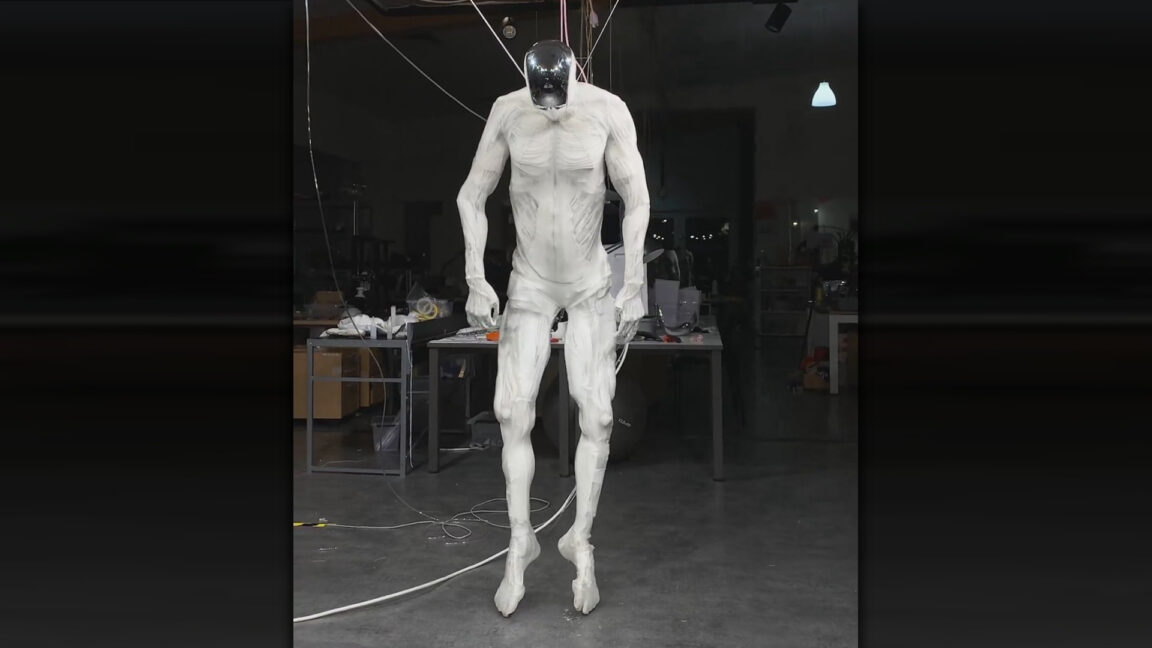Terrifying
“At long last, we have created the Torment Nexus from classic sci-fi novel Don’t Create The Torment Nexus”
Now have it stand on the ground without supports.
Data? Is that you?

Maybe a weird aside, but what does this mean?
pushing fluid at 40 standard liters per minute.
Are there “liters” other than the 10cm x 10cm x 10cm definition?
To totally confuse you: The USA uses the “standard litre” while Europe uses “normal litre”:
Thanks, you succeeded hahaha.
From what I’m reading there this is a measure of mass flow rate of gas, expressed as volume per minute at some standard volume and pressure. Which makes some sense, you need those two parameters to be fixed so you can measure mass by volume.
And then I realized the OP article uses it for a fluid 😂
Volume changes based on temperature and pressure. So when we reference volume measurements like for flow rates, we typically do the math to adjust those to standard temperature and pressure. Standard pressure is 1 atm but standard temperature varies based on who you’re talking to because of competing standards. It’s usually 25 C or 20 C.
When we want to reference the non temperature and pressure corrected volume, we append actual to it so that people know what the measurement is. Some people don’t do that and that causes confusion for others using their work if the reading is standard or actual.
You mean the flow rate of a volume of liquid? What are you confused about exactly?
They’re asking why it’s “standard litres per minute”, instead of just “litres per minute”
Oh, well yeah Standard liters per minute or SLM, specifically refers to flow rates measured in the U.S.
So the “other” measurement would evidently be Europes “Normal liters per minute”.
What the difference is, I couldn’t tell you.

This kind of thing could actually be really beneficial for prosthetics. If we can make a robot that functions as close as possible to a human body at human size, then we can chunk it up to make prosthetics that work like your original limbs and are easy to adapt to.
Now we can have people twitching while hanging from the ceiling without having to hunt them in back alleys! Progress!
Science isn’t about why, it’s about why not!
I don’t like living in the future as much as young me thought I would.
We really are obsessed with replicating any and all sci-fi cautionary tales, aren’t we?
It’s the Torment Nexus dilemma.
I’m currently using ChatGPT to develop code that I intend to incorporate into my latest version of Roko’s basilisk v0.17.13
I see they are prepping for the live action QWOP movie.
Can’t wait to find out it was just a guy in a suit.
Or half of man in case of torso.

They really did go for the “horror movie about to go very wrong” aesthetic when they made those videos, didn’t they.
Yeah, what’s up with the music?
Sounds like the creepy in-mission music in the original X:COM
they could have gone so many different directions. nutcracker. river dance. yackety sax…
deleted by creator
Let’s ensure we also make household robots unreasonably strong and durable. We don’t want shotgun wielding humans to be able to disable one, or barricade in a house.
It’s clear they made this weird on purpose but still, so many questions…
the robot hangs suspended from the ceiling as its limbs twitch and kick, marking what the company claims is a step toward its goal of creating household-helper robots
Oh yeah, definitely a huge step in that direction…
Clone Robotics designed the Protoclone with a polymer skeleton that replicates 206 human bones
That’s all of the bones of an human adult. Yeah, I’m sure absolutely all of them were necessary.
That’s all of the bones of an human adult. Yeah, I’m sure absolutely all of them were necessary.
Are you trying to imply they gave it a dick? If so they don’t have bones in them.
No, it’s pretty much only you thinking that. The rest of us were thinking about the 6 tiny bones in the ears only used for hearing or dozens of weird little bones in the wrists and ankles.
Doesn’t mean they didn’t give it a dick though
Hmm, I have some questions to ask myself seemingly
Exactly, ear in particular was what I thought about. There are very tiny bones in there. I’m pretty sure they didn’t replicate a functional human ear, so those have no impact on anything.
Many bones in the hand and foot are also locked in place together, so modeling each one seems, well, I don’t think it’s a waste of time, but at this point you’re making an art performance.
I have literally no idea how that came to your mind immediately. It’s very funny to me that it did though.
I don’t understand these companies’ obsession with humanoid robots. A robot doesn’t have to humanoid to be a useful household helper. It doesn’t even have to be humanoid for people to form a friendly bond with it (something I think would be a good quality in a “household helper”) just look at Star Wars droids
See also: Cogsworth
It has to be humanoid to live among humans, using human architecture and technology.
Some of this is also about less complicated ways to use patents that can also be applied to things like prosthetic limbs.
Also, it provides a control case with how well-studied human anatomy is. In terms of basic mechanical motion, there’s a clear baseline goal.
I remember seeing early versions of the synthetic muscle fibers years ago, but as far as ways to practically apply them and test, and refine them as control technology improves with machine learning. 10-15 years ago, this wasn’t really possible.
A humanoid robot can operate in the existing world. It can climb stairs and open a door, for example. A robot on wheels without arms can’t do that.
if you want it to interact with a wide range of environments and objects that were designed for humans, then a humanoid robot may be the way to go.
Maybe they’re attempting to make it ‘learn’ how to move itself using neural networking instead of programming discrete movement presets.
Ooh yeah let’s hope that’s the case.
the only thing I’m hoping for is that this can serve as a proof of concept that human brains might be able to learn to control limbs made of synthetic muscles like that…
The goal is to replicate humans, so yeah
It’s definitely made that accurate/creepy for marketing reasons, they’re probably hoping this will help them get investors. I would also assume you can simplify the human body design a good bit before losing the functionality we actually want from something like this.
How is it going to balance if it does not have a fake cochlea? /s
At first misread as cloaca. Barely even gave me pause in this thread.
Bravo scientists for realizing how creepy this is and saying, let’s lean into it.










